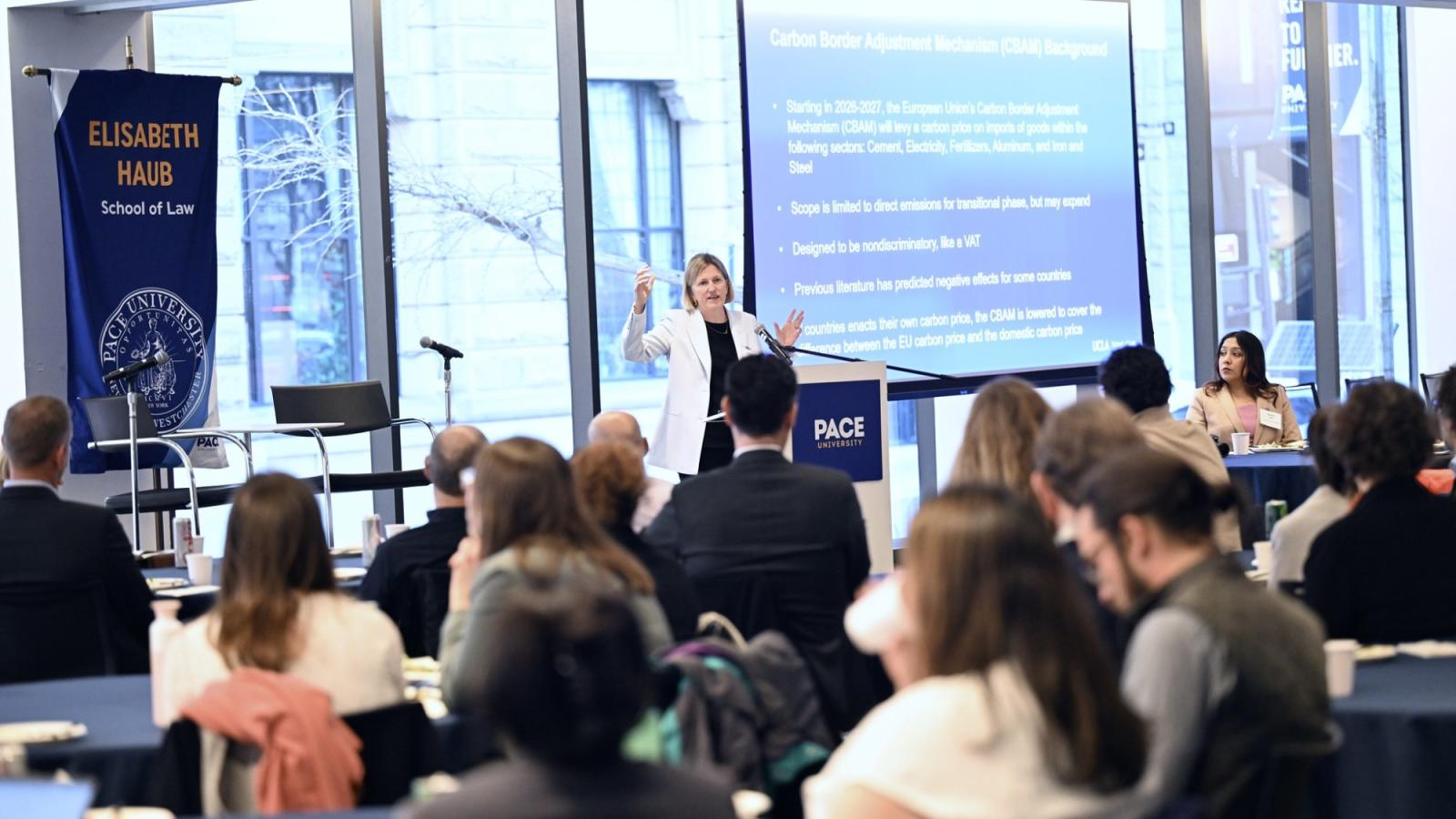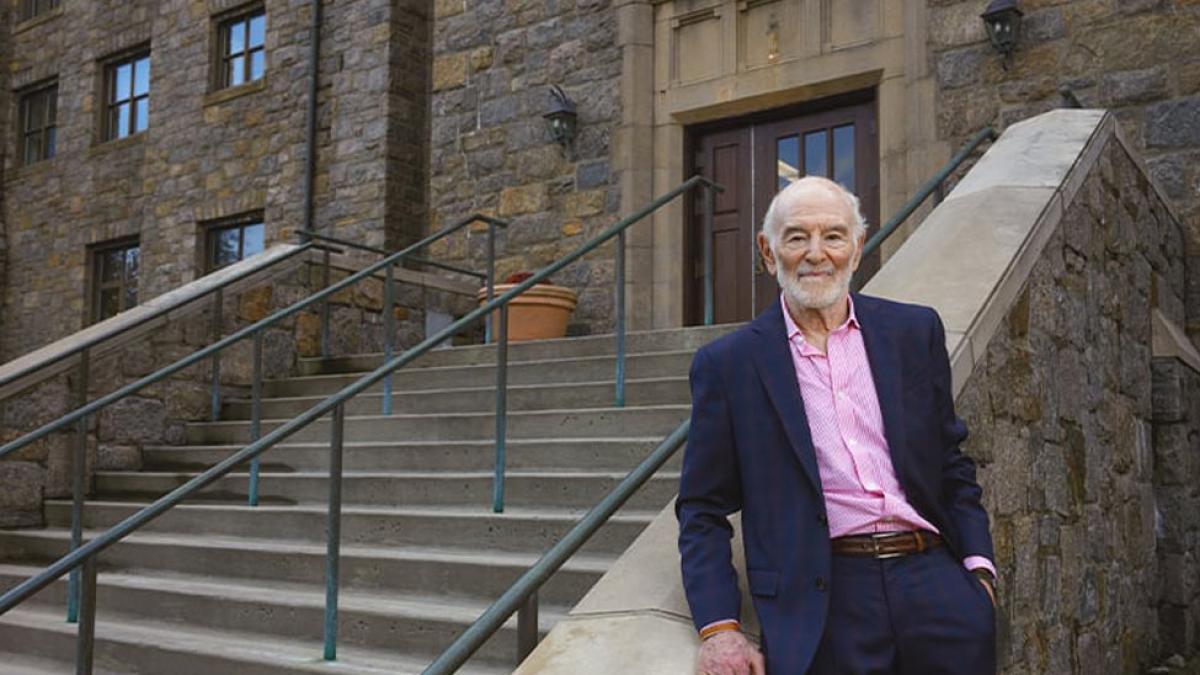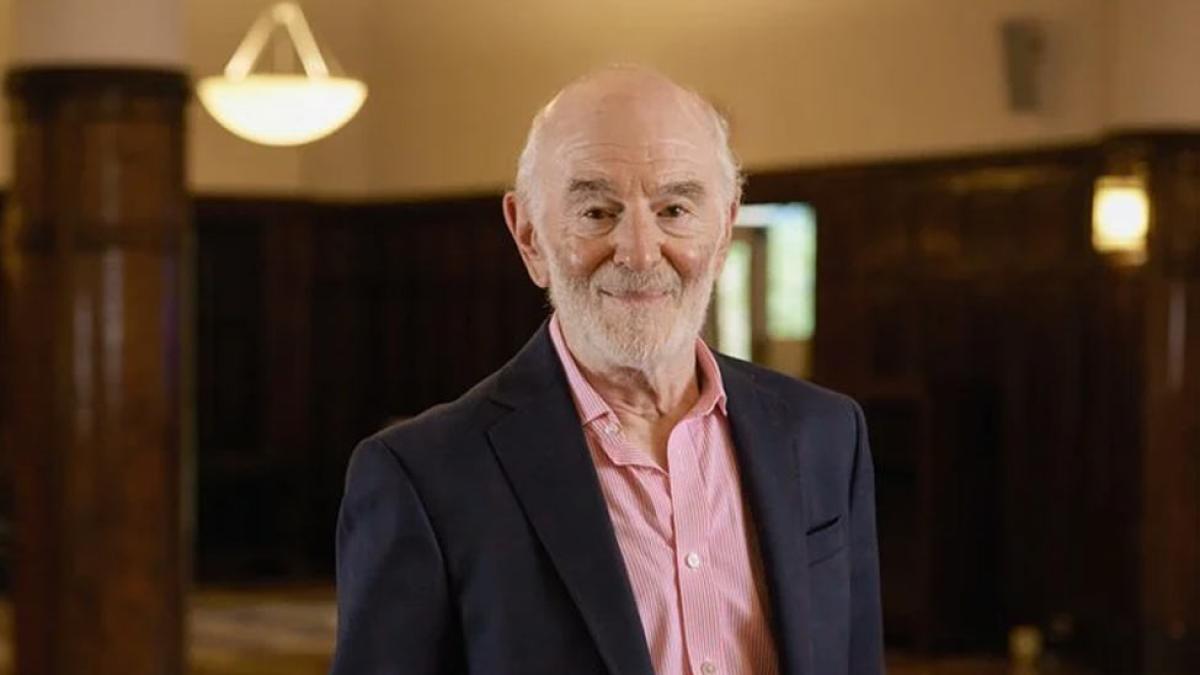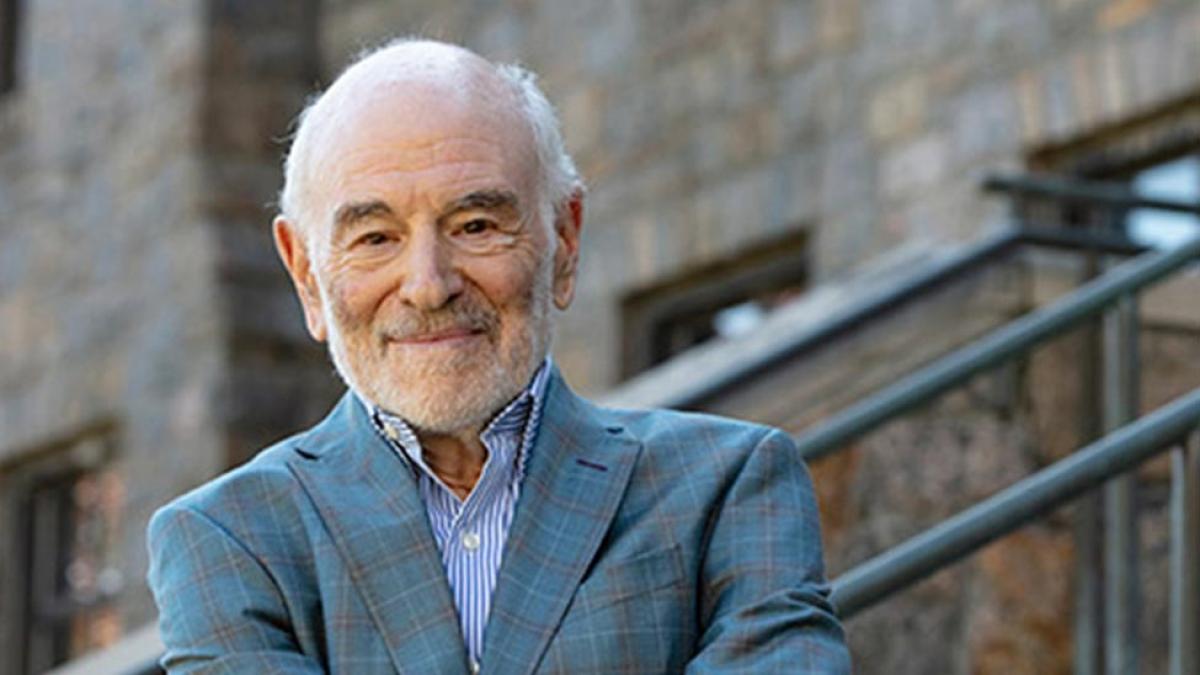Haub Law Professor Bennett Gershman speaks with ABC News 7 NY about the deadline requiring undocumented immigrants to register with the government saying migrants are “caught between a rock and hard place.”
Elisabeth Haub School of Law at Pace University Hosts Symposium on Tax Law, the Environment, and Climate Change with American Tax Policy Institute and Pace Environmental Law Review

On March 21–22, 2025, the Elisabeth Haub School of Law at Pace University proudly hosted the American Tax Policy Institute (ATPI) and Pace Environmental Law Review (PELR) Symposium on Tax Lax, the Environment, and Climate Change. The two-day symposium, held on Pace University’s downtown campus, explored the intersections of tax law, climate change, and environmental policy. The symposium brought together leading experts, policymakers, scholars, and practitioners to discuss the critical role of tax policy in addressing pressing environmental challenges and advancing sustainability.
The symposium opened with remarks by Bridget Crawford, University Distinguished Professor, Elisabeth Haub School of Law at Pace University, and President of the American Tax Policy Institute. In her remarks, Professor Crawford emphasized that each person -- including lawyers, economists, policy experts, students, and members of the general public – can play a role in halting the ongoing irreversible damage to our planet. She went on to outline key agenda items for addressing climate change, including the need to: recognize the power of tax law to shape behavior and attitudes, examine the differential impacts of environmental harm, acknowledge that what may seem neutral is not always fair, bridge the gaps between law and both social science and social justice, push for reform in legal and economic structures, consult with those who live with the daily consequences of environmental degradation in order to develop solutions, expand the discourse beyond historically traditional frames, and foster dialogue across coalitions. Professor Crawford aptly stated that, “Saving the planet is not a political issue; it is a practical one,” and that while there is no single answer to the climate crisis, everyone can have a positive impact by embracing what they do best, whether that be teaching, writing, advocating, or some other work. She noted in closing that, “The fight for environmental justice will not be won in a single courtroom or a single legislative session – but it will be won through the collective efforts of us all.”
"Saving the planet is not a political issue; it is a practical one."
Immediately prior to Professor Crawford’s remarks, Mackenzie Wittig ’25, Symposium Editor for the Pace Environmental Law Review, delivered brief welcoming remarks. The first day of the academic conference consisted of numerous panels that covered various aspects of discussing the intersection of tax law and the environment. Specific panel topics included Climate Change and the Inflation Reduction Act: How We Got Here; Carbon Tax and Other Pricing Proposals; Taxation, Economic Impacts, and Environmental & Social Justice; and Place-Based Environmental Initiatives. Each panel provided a platform for forward-thinking discussions by top academics, practitioners, and policymakers in their respective fields. Mackenzie Wittig later reflected that, “This was a stimulating program that got so many of us thinking about the ways that tax law is integral to environmental law and vice versa. There is no doubt that we need lawyers with expertise in both fields, and this symposium framed the issues in a way that was both educational and inspiring.”
A highlight of the first day was the keynote address delivered by Kimberly Clausing, PhD, the Eric M. Zolt Chair in Tax Law and Policy, UCLA School of Law. Professor Clausing’s keynote focused on International Climate Cooperation After 2024 and opened with the recognition that climate change is a global problem that cannot be solved unless we “bring together the world.” Her lecture established a timeline of the climate change crisis, the US climate policy in 2025, key challenges for global emissions reduction, and how to create better incentives for governments to cooperate and make large-scale changes. Significantly, Professor Clausing noted that any policy solutions must consider equity issues in and between countries. She also acknowledged policy tools are not well-equipped to take equity into account, which in turn creates difficulties. Throughout her lecture, Professor Clausing acknowledged the multiple ways that current political tensions inform responses to the climate crisis. She closed her address with a carbon-pricing proposal that aims to be fair and provide adequate incentives for multinational participation. Countries must work together to address climate change, Professor Clausing observed.
Following the keynote, Julie Divola, Esq., partner at Pillsbury Winthrop Shaw Pittman LLP and the American Tax Policy Institute Immediate Past President, moderated a Q&A.
The first day concluded with a wine and cheese networking reception. Several Pace Environmental Law Review students gave one-minute presentations of their student notes before informal conversations among panelists, students, and other conference attendees.
The second day of the symposium featured a panel on the topic of Sustainable Finance, ESG, and Climate Resilience. Closing remarks were delivered by Roberta F. Mann, Professor Emerita, University of Oregon School of Law and American Tax Policy Institute Trustee and Mackenzie Wittig ’25, Pace Environmental Law Review Symposium Editor. Attendees also had the option of joining a unique educational excursion to Governors Island hosted by the New York Climate Exchange. The hands-on experience provided both a networking opportunity and an educational experience.
The innovative symposium was a joint effort between the American Tax Policy Institute (ATPI) and the Pace Environmental Law Review (PELR), two organizations dedicated to advancing scholarship and policy discussions in their respective fields. ATPI’s commitment to rigorous tax policy research and PELR’s role in publishing cutting-edge environmental law scholarship made this an unparalleled opportunity for exploring solutions at the intersection of tax and the environment. The symposium reflected Haub Law’s ongoing commitment to interdisciplinary legal education and its leadership in environmental law and policy. The event brought together experts in both tax and environmental law, opening conversations for collaboration across the two areas of law.
Haub Law’s Environmental Law Program—ranked #1 in the country by U.S. News & World Report—has been at the forefront of environmental legal scholarship, policy advocacy, and experiential learning for decades. Through events like this symposium, the program continues to be at the forefront of environmental legal education and innovation. Established in 1982, PELR was one of the first scholarly journals established in the then-new field of environmental law. Affiliated with the highest-ranked Environmental Law Program in the nation, PELR is committed to publishing the most influential and innovative scholarship in the field of environmental law. A special symposium edition of PELR will be published later this year.
The symposium also shone a spotlight on the Tax Program at Haub Law. The school has a longstanding history of educating students in business and tax-related matters. During their studies, Haub Law students take at least one course that offers exposure to administrative law, legislation, and/or the regulatory process. Both Environmental Law Survey and Federal Income Taxation are among the most popular offerings. Students who are interested in continuing their tax studies can choose upper-level courses in Corporate & Partnership Taxation, Tax Policy, and more. Through the Lubin School of Business, students also can pursue a variety of joint degrees with business as the core focus.
"Haub Law students are sought-after candidates for positions in large accounting firms, law firms of all sizes, businesses, and non-profit organizations."
“Haub Law students are sought-after candidates for positions in large accounting firms, law firms of all sizes, businesses, and non-profit organizations,” said Professor Crawford. “In recent years, several graduates of Haub Law have continued their studies in Masters of Law in Taxation programs at Boston University, Georgetown University, Northwestern University, the University of Miami, and the University of San Diego.”
The American Tax Policy Institute is a section 501(c)(3) organization whose Trustees and members are some of the leading experts on taxation from the fields of law, accounting and economics. ATPI is a nonpartisan organization that promotes and facilitates scholarly research, analysis, examination, and discussion of tax policy proposals and issues in order to improve the tax system and to provide assistance to governmental authorities involved in tax administration. ATPI supports scholarship in law, accounting, and economics that will aid policymakers and administrators and improve our tax system. The mission of ATPI is to bring together lawyers, economists, accountants, and others who make or implement tax policy in order to analyze tax systems, explore possible improvements to them, and promote understanding of their impact on society.
The highly anticipated event was made possible with support from:
- American Tax Policy Institute
- Pace Environmental Law Review
- American College of Tax Counsel
- American Bar Association Tax Section
- Elisabeth Haub School of Law at Pace University
- Sustainable Business Law Hub
- Pace | Haub Environmental Law
- Caplin & Drysdale
- UConn School of Business Masters of Science in Social Responsibility & Impact in Business


